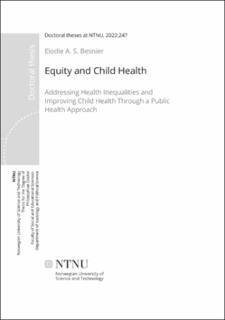| dc.contributor.advisor | Eikemo, Terje Andreas | |
| dc.contributor.advisor | de Soysa, Indra | |
| dc.contributor.advisor | Palermo, Tia | |
| dc.contributor.author | Besnier, Elodie A. S. | |
| dc.date.accessioned | 2022-09-14T08:08:54Z | |
| dc.date.available | 2022-09-14T08:08:54Z | |
| dc.date.issued | 2022 | |
| dc.identifier.isbn | 978-82-326-5320-1 | |
| dc.identifier.issn | 2703-8084 | |
| dc.identifier.uri | https://hdl.handle.net/11250/3017720 | |
| dc.description.abstract | “Leaving no one behind”, as the United Nations’ Sustainable Development Goals promise, is a goal most of us support, especially when children are concerned. However, the road towards this goal is more challenging than the slogan suggests. In this thesis, I try to understand whether and how empowerment in public health interventions can provide a double gain in low- and middle-income countries: improving child health and health equity. More specifically, I explore four questions: what interventions work, how empowerment can work for child health, how empowerment has been actually translated into public health interventions, and what their effects have been on child health and health equity.
Starting from a global perspective, this thesis then goes into the details of a promising type of social protection program for health equity, through a case study of Lesotho’ Child Grants Program. To tackle the complex ways through which, in a given program, empowerment can lead to a healthier, fairer start in life, I combine qualitative, quantitative and mixed methods.
The body of evidence on the effects of various interventions on child health and equity is growing, thanks to a more diverse and transparent definition of health equity in research and programs. This thesis finds that some preventive interventions targeting disadvantaged children can deliver on the double promise of child health and equity. However, the way they can do so is complex. Building solid, global evidence on this will require further research. Secondly, I find that economic empowerment components targeting children and their households show more promises than broader, more structural empowerment efforts. However, testing the effect of empowerment in a given program is hampered by the challenges of translating a complex idea (like empowerment) into practical tasks and activities.
This thesis makes two main contributions to health equity research and practice. The first is to the field of health equity research. I follow a comprehensive definition of health equity that goes beyond the exclusive focus on the most-disadvantaged groups. This approach clarifies the effects and the mechanisms of action of interventions not only on health equity but also on child health in the wider community. The second contribution of this thesis is to the field of social protection. Examination of the Child Grants Program provides a concrete case study of how empowerment strategies and child health equity are integrated into a specific program.
Besides its contribution to research, this thesis is a plea for open discussions in program planning and implementation about what lies behind broad development promises like empowerment and “Leaving no one behind”. | en_US |
| dc.language.iso | eng | en_US |
| dc.publisher | NTNU | en_US |
| dc.relation.ispartofseries | Doctoral theses at NTNU;2022:247 | |
| dc.relation.haspart | Paper 1:
Besnier, Elodie; Thomson, Katie; Stonkute, Donata; Mohammad, Talal; Akhter, Nasima; Todd, Adam; Jensen, Magnus Rom; Kilvik, Astrid; Bambra, Clare.
Which public health interventions are effective in reducing morbidity, mortality and health inequalities from infectious diseases amongst children in low- and middle-income countries (LMICs): an umbrella review.. PLOS ONE 2021 ;Volum 16.(6)
https://doi.org/10.1371/journal.pone.0251905
This is an open access article distributed under the terms of the Creative Commons Attribution License CC BY | |
| dc.relation.haspart | Paper 2:
Besnier, Elodie.
Women’s political empowerment and child health in the sustainable development era: A global empirical analysis (1990–2016). Global Public Health 2020
https://doi.org/10.1080/17441692.2020.1849348
This is an Open Access article distributed under the terms of the Creative Commons Attribution-NonCommercial-NoDerivatives License (http://creativecommons.org/licenses/by-nc-nd/4.0/) | |
| dc.relation.haspart | Paper 3:
Besnier, Elodie Anne Suzanne; Hlabana, Thandie; Kotzias, Virginia Irene; Beck, Kathryn Christine; Sieu, Celine; Muthengi, Kimanzi.
Exploring economic empowerment and gender in Lesotho’s Child Grants Program: A qualitative study.
- The final published version is available in Health Policy and Planning 2023
https://doi.org/10.1093/heapol/czad009
This is an Open Access article distributed under the terms of the Creative Commons Attribution License (https://creativecommons.org/licenses/by/4.0/) | |
| dc.relation.haspart | Paper 4:
Besnier, Elodie Anne Suzanne; Kotzias, Virginia Irene; Hlabana, Thandie; Beck, Kathryn Christine; Sieu, Celine; Muthengi, Kimanzi.
Exploring health equity in Lesotho’s Child Grants Program.
- The final published version is available in Health Policy and Planning 2024
https://doi.org/10.1093/heapol/czad116
This is an Open Access article distributed under the terms of the Creative Commons Attribution License (https://creativecommons.org/licenses/by/4.0/) | |
| dc.relation.haspart | Paper 5:
Besnier, Elodie Anne Suzanne; Finseraas, Henning; Sieu, Celine; Muthengi, Kimanzi.
Using cash transfers to promote child health equity: An analysis of Lesotho's Child Grants Program.
- The final published version is available in Health Policy and Planning 2023
https://doi.org/10.1093/heapol/czad044
This is an Open Access article distributed under the terms of the Creative Commons Attribution License (https://creativecommons.org/licenses/by/4.0/) | |
| dc.title | Equity and Child Health: Addressing Health Inequalities and Improving Child Health Through a Public Health Approach | en_US |
| dc.type | Doctoral thesis | en_US |
| dc.subject.nsi | VDP::Social science: 200 | en_US |
